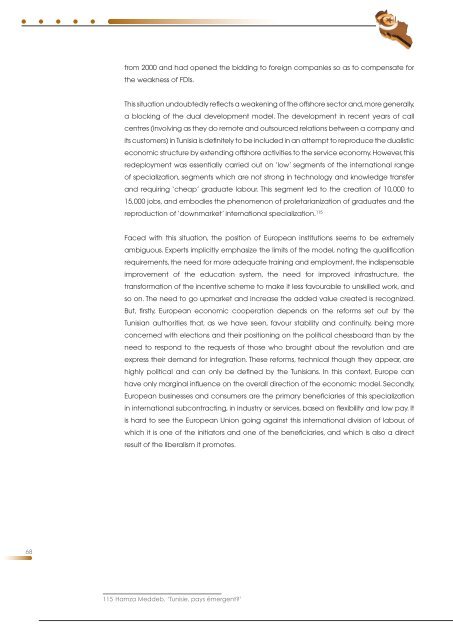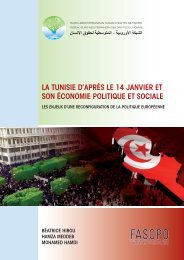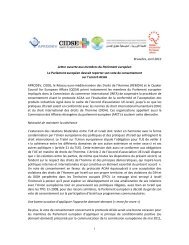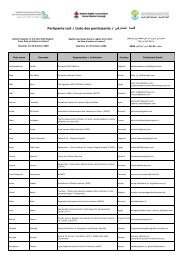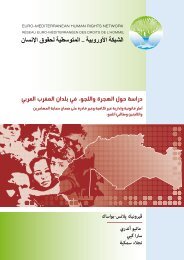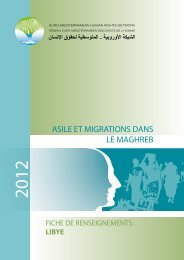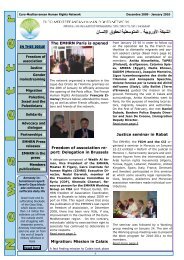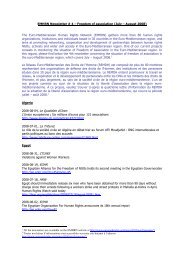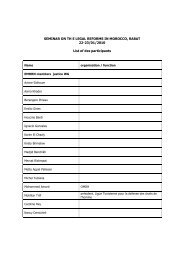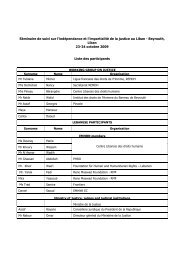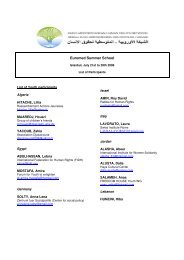from 2000 <strong>and</strong> had opened the bidding to foreign companies so as to compensate forthe weakness of FDIs.This situation undoubtedly reflects a weakening of the offshore sector <strong>and</strong>, more generally,a blocking of the dual development model. The development in recent years of callcentres (involving as they do remote <strong>and</strong> outsourced relations between a company <strong>and</strong><strong>its</strong> customers) in Tunisia is definitely to be included in an attempt to reproduce the dualisticeconomic structure by extending offshore activities to the service <strong>economy</strong>. However, thisredeployment was essentially carried out on ‘low’ segments of the international rangeof specialization, segments which are not strong in technology <strong>and</strong> knowledge transfer<strong>and</strong> requiring ‘cheap’ graduate labour. This segment led to the creation of 10,000 to15,000 jobs, <strong>and</strong> embodies the phenomenon of proletarianization of graduates <strong>and</strong> thereproduction of ‘downmarket’ international specialization. 115Faced with this situation, the position of European institutions seems to be extremelyambiguous. Experts implicitly emphasize the lim<strong>its</strong> of the model, noting the qualificationrequirements, the need for more adequate training <strong>and</strong> employment, the indispensableimprovement of the education system, the need for improved infrastructure, thetransformation of the incentive scheme to make it less favourable to unskilled work, <strong>and</strong>so on. The need to go upmarket <strong>and</strong> increase the added value created is recognized.But, firstly, European economic cooperation depends on the reforms set out by theTunisian authorities that, as we have seen, favour stability <strong>and</strong> continuity, being moreconcerned with elections <strong>and</strong> their positioning on the <strong>political</strong> chessboard than by theneed to respond to the requests of those who brought about the revolution <strong>and</strong> areexpress their dem<strong>and</strong> for integration. These reforms, technical though they appear, arehighly <strong>political</strong> <strong>and</strong> can only be defined by the Tunisians. In this context, Europe canhave only marginal influence on the overall direction of the economic model. Secondly,European businesses <strong>and</strong> consumers are the primary beneficiaries of this specializationin international subcontracting, in industry or services, based on flexibility <strong>and</strong> low pay. Itis hard to see the European Union going against this international division of labour, ofwhich it is one of the initiators <strong>and</strong> one of the beneficiaries, <strong>and</strong> which is also a directresult of the liberalism it promotes.68115 Hamza Meddeb, ‘Tunisie, pays émergent?’
T U N I S I A A F T E R 1 4 J A N U A R Y A N D I T S S O C I A L A N D P O L I T I C A L E C O N O M YT H E I S S U E S A T S T A K E I N A R E C O N F I G U R A T I O N O F E U R O P E A N P O L I C YII.2.A.c. The agricultural <strong>economy</strong>A reconsideration of the model of development also means taking greater account of<strong>its</strong> agricultural dimension. The share of agricultural trade in total trade has fallen steadily,from 23.4% during the period 1984-1988 to 13.6% for the years 1999-2003, reaching lessthan 13% today. It confirms the status of Tunisia as a net importer of agricultural products. 116This decline is accompanied by a very high inequality in the structure of farming. 117 Thefragmentation of farms, often family businesses, thus forces young men, mainly youngerbrothers, to migrate in order to preserve the homestead by financially assisting theirparents who remain in rural areas to live on their l<strong>and</strong>. Indeed, the yields from the l<strong>and</strong>prove most often insufficient to meet the needs of their kin. This situation largely explainsthe aging farm population: faced with poor harvests <strong>and</strong> pay deemed to be derisory,young men prefer to try the path of rural exodus to find jobs in other sectors of the<strong>economy</strong>, or else international migration - particularly the more affluent among them.This situation, indeed, has not failed to create a shortage of male labour in rural areas,a shortage felt especially at harvest time. It is often women who work the family farml<strong>and</strong> or sell their labour at extremely low wages (4 TD per day, equivalent to 2.5 euros in2005/2006). This situation has persisted up to the present. If construction workers receive 8TD, women who work in agriculture receive much less (maximum 6 TD but often less), <strong>and</strong>this is one of the explanations for the rural exodus <strong>and</strong> the feminization of the agriculturallabour force. It is more financially advantageous for men to go <strong>and</strong> work on constructionsites, on the coast or in Tunis. Agricultural employment is the main source of job creationfor women in Tunisia.While the agricultural workforce increased by 20% between 1993 <strong>and</strong> 2002, productivityhas not so far followed this increase. Furthermore, over the same period, performance inthe agricultural sector was obtained at the price of costs borne by the rest of society:firstly, subsidies for compensation amounted to 180 million TD, <strong>and</strong> secondly, pricedistortion contributes to an increase of 4% of the cost of living for consumers <strong>and</strong> 0.8% ofGDP in growth lost due to price distortion. 118 Rethinking the development model requiresthat the policy of subsidy, redistribution <strong>and</strong> transfer of income be radically revised, asindeed suggested by the aforementioned World Bank report which emphasized that theexisting transfers <strong>and</strong> incentives were highly inequitable, benefiting primarily the wealthy.116 Jean-François Richard, ‘Le devenir de l’agriculture tunisienne face à la libéralisation des échanges’,Afrique contemporaine, n° 219, 2006/3, pp. 29-42.117 Ibid: ‘The structures of farming contrast greatly with one another: in 1995, 53% of farmers had less than5 hectares (with an average of 2 hectares) <strong>and</strong> occupied 9% of agricultural l<strong>and</strong>, <strong>and</strong> 1% of farmershad over 100 hectares (with an average of 300 hectares) <strong>and</strong> occupied a quarter of agricultural l<strong>and</strong>.The average surface area of the 50,000 farmsteads is around 10 hectares, <strong>and</strong> this average figure hasbeen dropping for 40 years, as l<strong>and</strong> continues to be broken up’, p. 35.118 These calculations were made by the World Bank in <strong>its</strong> abovementioned Report on agriculture, p. 2006.69The reconfiguration of power, the socio-economicchallenges of the revolution, <strong>and</strong> European policy


